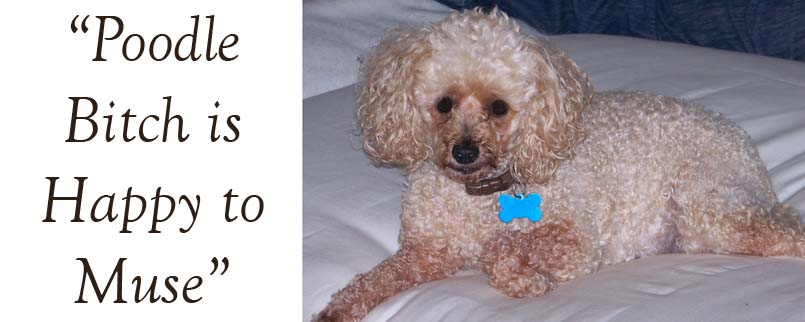Poodle Bitch finally made it through this long Time story entitled "The Secrets Inside Your Dog's Mind," and she is once again left scratching her head. Apparently, Duke University has a facility (or will have, the article is poorly worded) called the Duke Canine Cognition Center. How serious is this facility? Poodle Bitch instructs the reader to take a look at the photo of the person who will be heading it:

How absolutely adorable! The head of this very important scientific facility is photographed upside down, laying on the ground beside a noble greyhound that is at least 32% more attractive than he. Taking a break that, the caption assures us, is "well deserved." Because this work, Poodle Bitch is sure, is quite strenuous:
"Henry!" he says. Henry is a big black schnauzer-poodle mix--a schnoodle, in the words of his owner, Tracy Kivell, another Duke anthropologist. Kivell holds on to Henry's collar so that he can only gaze at the biscuit.
"You got it?" Hare asks Henry. Hare then steps back until he's standing between a pair of inverted plastic cups on the floor. He quickly puts the hand holding the biscuit under one cup, then the other, and holds up both empty hands. Hare could run a very profitable shell game. No one in the room--neither dog nor human--can tell which cup hides the biscuit.
Henry could find the biscuit by sniffing the cups or knocking them over. But Hare does not plan to let him have it so easy. Instead, he simply points at the cup on the right. Henry looks at Hare's hand and follows the pointed finger. Kivell then releases the leash, and Henry walks over to the cup that Hare is pointing to. Hare lifts it to reveal the biscuit reward.
Henry the schnoodle just did a remarkable thing. Understanding a pointed finger may seem easy, but consider this: while humans and canines can do it naturally, no other known species in the animal kingdom can. Consider too all the mental work that goes into figuring out what a pointed finger means: paying close attention to a person, recognizing that a gesture reflects a thought, that another animal can even have a thought. Henry, as Kivell affectionately admits, may not be "the sharpest knife in the drawer," but compared to other animals, he's a true scholar.
Poodle Bitch believes it is Henry the "schnoodle" who is running the shell game. She finds it remarkable that humans would find this remarkable. A domesticated dog found a biscuit, after being told where it was by a human.
So the humans think.
Henry the schnoodle knew where that biscuit was the entire time. Henry smelled it. Poodle Bitch would think that anyone who was in charge of something so serious sounding as a Canine Cognition Center would at least know something about dogs' sense of smell.
Poodle Bitch would also like to point out that Henry could tell exactly what it was that the human expected of his behavior, because he has lived with humans his entire life. Domesticated pets have to read their humans companions because they depend upon them for food and shelter. In this way, the cynic would point out, they have fully assimilated the human concept of "love."
Speaking of "pointing," which seems to so fascinated the researchers and the author of the article:
A chimp can follow the gaze of other chimps and figure out what they can and cannot see. That's a skill that seems to be limited to great apes and humans. Tomasello and his team wondered if such a rare ability extended to hand gestures and tested chimps to see if they could understand pointing. To their surprise, the chimps did badly, able to learn the meaning of a pointed finger only after lots of training.
It is only after "lots of training" that any animal can do anything of interest to humans. Any animal that spends a lot of time with humans is going to pick up on those things, and do them. The animal will do this out of "love." Poodle Bitch notes W. Somerset Maugham's famous quotation "Love is only a dirty trick played on us to achieve continuation of the species."
Poodle Bitch disagrees with the tone of the quotation, but the sentiment is certainly true. It is not a dirty trick, but it is a trick. It's a trick in the same way that human love is a "trick." For a sense of safety and security, shelter, and, of course, food. Poodle Bitch would like to now show the author of the article, and the Duke researchers, exactly why it is that dogs are so good at figuring out the concept of "pointing":

The above is a photograph of what happens when Poodle Bitch attempts to cook for herself. This is the best she can do on her own; a microwaved banana. It took her all day. Humans, on the other hand, can make chicken, slice tomatoes, create soups and sauces, and truly lovely meals that she could not create on her own. Poodle Bitch has no opposable thumbs.
It is only the by the best good luck that she happens to love her humans so very much.



2 comments:
TFi would like Poodle Bitch to know that not all humans are stupid. There are some of us - dastardly creatures - that have perfected what we call 'the con job'.
In the case of Duke University they are clearly going to hustle for funding ie money - something huMans love more than they do bitches.
Poodle Bitch should rest assured; canines aren't the ones being conned here. Though the schnoodle is a doggone enabler.
Being a fan of the great hardboiled crime novelist Jim Thompson, Poodle Bitch knows a thing or two about "Grifters." That said, she does try to give people the benefit of the doubt.
Post a Comment